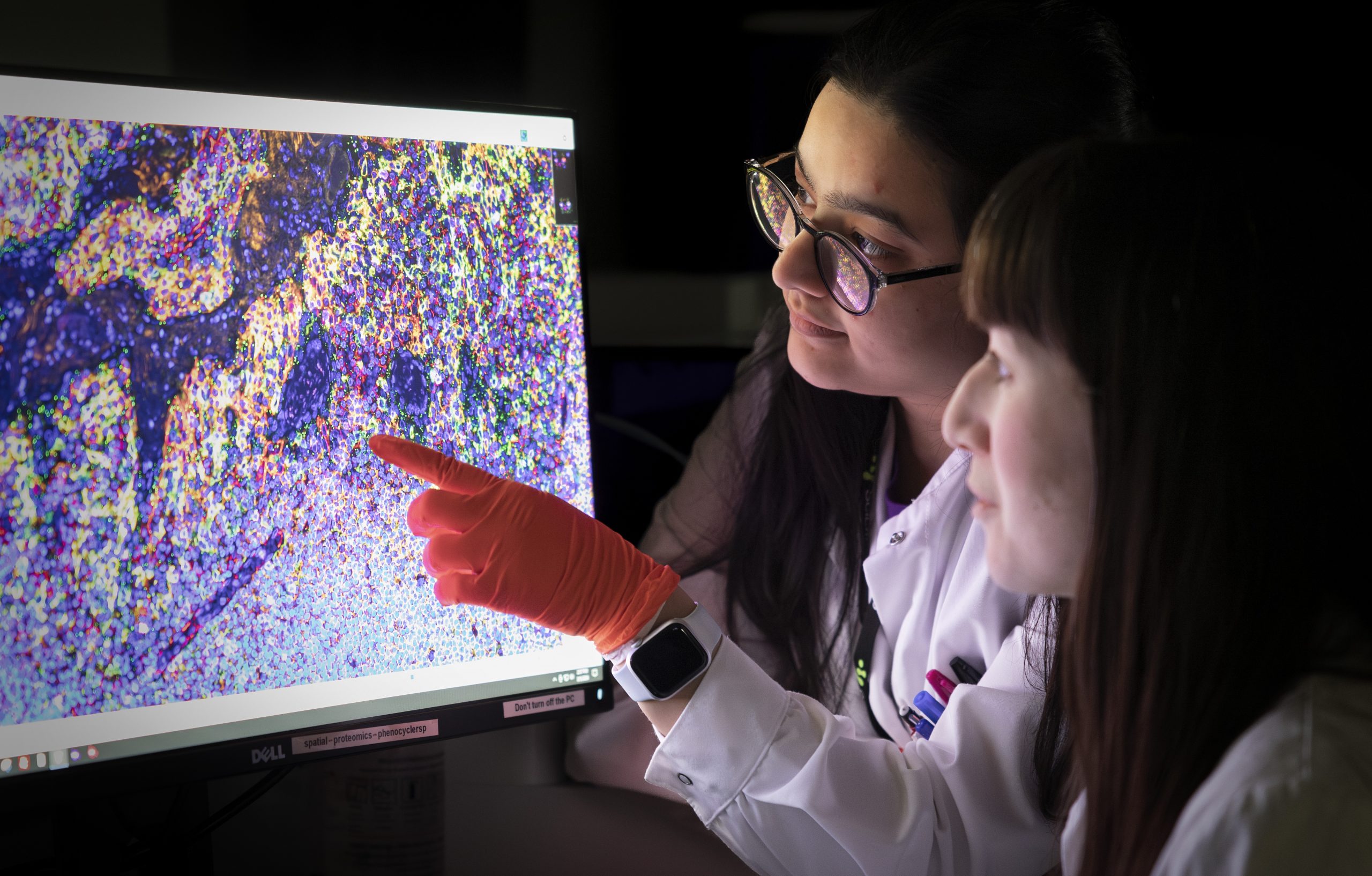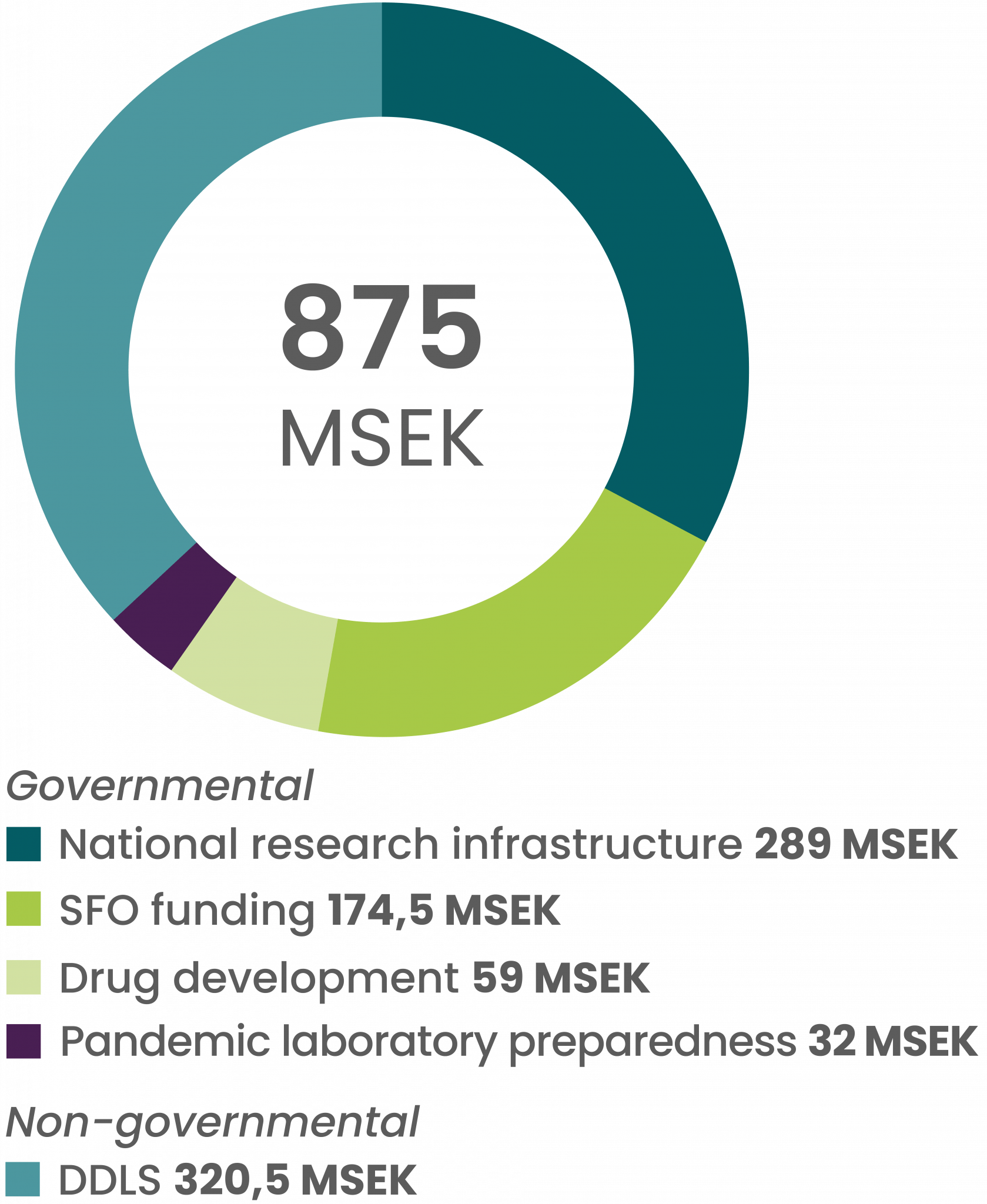
Funding
Up until 2019, the core SciLifeLab funding consisted of three separate funding sources from the government: national infrastructure funding (National), Drug Discovery and Development funding (DDD), and strategic research area funding (SFO) to the four founding universities. The SciLifeLab Board is the deciding body for the National and DDD funding, while the SFO funding is distributed directly to each of the four universities and is controlled by the SciLifeLab committees at these universities.
In 2020, new non-governmental funding sources were also introduced thanks to generous donations from KAW. The first funding was given in response to the global COVID-19 pandemic. This program was extended in late 2020 to continue for two more years and is now incorporated into the Pandemic Laboratory Preparedness capability. Through a major 3.1 BSEK donation from KAW, a national program on data-driven life science (DDLS) was then launched in 2021.
The four-year SciLifeLab budget from the government increased for the current budget period 2021–2024. In addition to increased base funding to the infrastructure of 150 MSEK for 2021–2024, SciLifeLab obtained funding from the government for Pandemic Laboratory Preparedness (130 MSEK). Thus, the total national infrastructure funding, including the DDD, was 309 MSEK for 2021, and gradually increased to 344 MSEK in 2024. The SFO funding has been about 165 MSEK/year (distributed across the four universities).
In addition to the funding streams described above, the SciLifeLab infrastructure is also supported by considerable funding from additional sources, including grants from VR, non-governmental funding agencies, universities and user fees. In addition, SciLifeLab has over the past few years successfully obtained several external grants to support projects and/or collaborative efforts involving SciLifeLab initiatives and SciLifeLab Operations Office.
Management
As a national infrastructure and collaborative organization across many universities, supported by several independently organized governmental and private funding sources, SciLifeLab as an organization has evolved from the original Stockholm-Uppsala centric model towards a complete nationally located model, where most, but not all functions operate under the National SciLifeLab Board. SciLifeLab is in a unique position in that it has its own line-item for the national SciLifeLab infrastructure funding in the governmental budget. The official legal, administrative and financial host organization of SciLifeLab is KTH, though KTH shares this responsibility with the other founding universities SU, UU and KI through a formal agreement signed by all four parties.
The next sections also describe the many components of the SciLifeLab organization that have evolved in response to the growth of the SciLifeLab organization, and that are tailored towards ensuring:
- that university specific SciLifeLab SFO funds are governed by each corresponding legal host
- that the SciLifeLab Stockholm Campus Solna organization is governed well across the 3 participating parties and together the national infrastructure
- that in each program we engage those stakeholders that are involved in each corresponding SciLifeLab function or activity.
The DDLS program is placed directly under the SciLifeLab Board. However, due to the nature of the privately funded DDLS program (Knut and Alice Wallenberg Foundation), with 11 equal partners and specified scientific profile, the board has delegated the task to operate the DDLS program to a distinct DDLS steering group.
Leadership and governance
The SciLifeLab Board is the highest deciding body with the overall responsibility for national coordination and infrastructure funding. The Board also controls the DDLS funding, as stipulated in the donation letter from KAW. The Board is composed of the Chair and eight additional members of whom four are representing the founding universities KTH Royal Institute of Technology (KTH), Karolinska Institutet (KI), Stockholm University (SU) and Uppsala University (UU), three other Swedish universities, and one industry representative. The Chair and industry representative are appointed by the government, while remaining members are appointed by the KTH Board.
- Ylva Engström, Professor at the Department of Molecular Biosciences at Stockholm University and member of the Royal Swedish Academy of Sciences
- Christoph Varenhorst, AstraZeneca, Government appointed industry representative
- Mikael Lindström, Professor, Deputy president, KTH Royal Institute of Technology
- Mats Larhed, Professor, Vice-rector Uppsala University
- Lena Mäler, Professor, Dean, Deputy Vice President, Stockholm University
- Martin Bergö, Professor, Vice President, Karolinska Institutet
- Anna Arnqvist Björklund, Professor, Associate Dean for Research of the Faculty of Medicine, Umeå University
- Carina Mallard, Professor, Deputy Vice-Chancellor, University of Gothenburg
- Jonas Larsson, Professor, Faculty of Medicine, Lund University
- Gunilla Westergren-Thorsson, Professor, Lund University (adjunct, National SciLifeLab Committee Chair)
- Andreas Muranyi Scheutz, Region Stockholm (adjunct, GMS representative)
More information
The SMG consists of the SciLifeLab Director, Co-Director, Infrastructure Director, as well as the Scientific Directors (representing each of the founding host universities), the Site Directors (representing each of the SciLifeLab sites), the Integration Directors, and the operational leadership of Operations Office and Data Centre.
SciLifeLab Director, Co-Director and Infrastructure Director
Scientific Directors
Site Directors
Integration Directors
Operational Leadership
Each of the four founding universities have dedicated SciLifeLab Committees, either chaired by or with the SciLifeLab Integration Director as committee member, that govern the SFO at the respective university and coordinate interactions with the national infrastructure, other founding universities, Campus Solna, and in the future also the DDLS program.
SciLifeLab committee Karolinska Institutet
- Urban Lendahl, Integration Director, Chair
- Carsten Daub, Scientific Director
- Kristina Broliden
- Eva Hellström-Lindberg
- Vicente Pelechano Garcia
- Ola Larsson
- Camilla Engblom, representing SciLifeLab Fellows
SciLifeLab committee KTH Royal Institute of Technology
- Amelie Eriksson Karlström, Integration Director, Chair
- Hjalmar Brismar, Scientific Director
- Peter Nilsson
- Anniina Vihervaara
- Lukas Käll
- Lucie Delemotte
- Kevin Smith
- Anna Herland
SciLifeLab committee Stockholm University
- Catarina Rydin, Integration Director, Chair
- Christos Samakovlis, Scientific Director
- Tom Britton
- Niclas Kolm
- Erik Lindahl
- Regina Lindborg
- Lena Mäler
- 2 representatives from the student organization
SciLifeLab committee Uppsala University
- Eva Tiensuu Janson, Integration Director, Chair
- Staffan Svärd, vice Chair
- Karin Forsberg Nilsson
- Mathias Hallberg
- Mattias Jakobsson
- Tove Fall
- Carolina Wählby
Deputies
- Anna Rosling
- Anna Dimberg
- Stina Syvänen
- Mikael Widersten
- Kim von Hackwitz (Co-opted)
- Aristidis Moustakas (Co-opted)
- Bengt Persson (Co-opted)
- Ola Spjuth (Co-opted)
- Johan Rung (Co-opted)
- Erika Erkstam (Co-opted)
The NSC consists of representatives of experts from across Sweden, with the task to oversee the national perspective of SciLifeLab infrastructure.
- Gunilla Westergren-Thorsson, chair, Lund Univ
- Eva Hellström Lindberg, Karolinska Institutet
- Cristina Al-Khalili Szigyarto, KTH
- Sara Hallin, SLU
- Tanja Slotte, Stockholm University
- Tobias Sjöblom, Uppsala University
- Martin Hallbeck, Linköping University
- Gustav Smith, University of Gothenburg
- Richard Lundmark, Umeå University
The CSC is responsible for campus-specific operations at Campus Solna and consists of Integration Directors (IDs) and Scientific Directors (SDs) linked to KI, KTH, and SU, and the Infrastructure Director. Co-opted member is the Campus Solna Director.
- Urban Lendahl, Karolinska Institutet (ID)
- Amelie Eriksson Karlström, KTH (ID)
- Catarina Rydin, Stockholm University, (ID)
- Hjalmar Brismar, KTH (SD)
- Carsten Daub, Karolinska Institutet (SD)
- Christos Samakovlis, Stockholm University (SD)
- Annika Jenmalm Jensen, Karolinska Institutet (Infrastructure Director)
Co-opted
- Per Ljungdahl, Stockholm University (Campus Solna Director)
The DDLS Director leads the steering group, which is the executive DDLS leadership that prepares decisions for the SciLifeLab Board. The steering group also has close links with the 11 partner organizations through a national reference group with members close to the leadership at these organizations.
Steering group
- Jan Ellenberg, Program director and chair, Professor at Karolinska Institutet
- Oliver Billker, Professor at Umeå University, Director MIMS
- Matts Karlsson, Professor at Linköping University
- Erik Kristiansson, Professor Chalmers/University of Gothenburg
- Janne Lehtiö, Professor at Karolinska Institutet
- Erik Lindahl, Professor at Stockholm University
- Tuuli Lappalainen, Professor at KTH Royal Institute of Technology
- Sara Hallin, Professor at the Swedish University of Agricultural Sciences
- Gunilla Westergren-Thorsson, Professor at Lund University/WCMM, Chair of National SciLifeLab Committtee
- Carolina Wählby, Professor at Uppsala University
- Siv Andersson, Knut and Alice Wallenberg Foundation representative
National reference group
- Margareta Wallquist (ts), Chalmers University of Technology (deputy: Ross King)
- Mattias Rantalainen, Karolinska Institutet (deputy: Carl-Johan Sundberg)
- Jochen Schwenk, KTH Royal Institute of Technology (deputy: Anniina Vihervaara)
- David Engblom, Linköping University (deputy: Fredrik Elinder)
- Jonas Larsson, Lund University (deputy: Marianne Jansson)
- Sebastian Kvist, NRM (Swedish Museum of Natural History) (deputy: Knut Jønsson)
- Catarina Rydin, Stockholm University (deputy: Marc Friedländer)
- Per Ingvarsson, Swedish University of Agricultural Sciences (SLU) (deputy: Göran Ståhl)
- Ronnie Berntsson, Umeå University (deputy: Johan Trygg)
- Johan Zelano, University of Gothenburg (deputy: TBD)
- Mats Larhed, Uppsala University (deputy: Staffan Svärd)
Research School Directors
- Olof Emanuelsson, KTH Royal Institute of Technology (PhD program)
- Peetra Magnusson, Uppsala University (PhD program)
- Lukas Käll KTH Royal Institute of Technology (PostDoc program)
More information
The Operations Office supports the SciLifeLab Board, Directors, MG, the infrastructure, and the research community in coordinating, administering and the execution of proposed actions. OO also supports the DDLS Steering Group and the DDLS program.
Operations management
Data Centre (DC) coordinates and supports activities throughout the SciLifeLab infrastructure life cycle of data; from project planning, data production, data analysis, data sharing, to publishing and reuse of data. DC works closely with MG, OO, all platforms, and also with the universities and the broad research community on data management and training. DC also has a major role in DDLS and its functions.
Data Centre management
The International Advisory Board (IAB) is an advisory body to the Board of SciLifeLab, consisting of expert members operating outside of Sweden. They contribute to SciLifeLab’s strategic development regarding research infrastructure and scientific direction and meets every two years to report to the SciLifeLab Board.
- Sören Brunak, Professor, University of Copenhagen, Denmark, Chair
- Ruedi Aebersold, Professor, ETH Zürich, Switzerland
- Jo Bury, VIB, Belgium
- Sirpa Jalkanen, Professor, University of Turku, Finland
- Janet Jansson, Pacific Northwest National Laboratory, USA
- Iain Mattaj, Professor, Human Technopole Foundation, Italy
- Svante Pääbo, Professor, Max Planck Institute for Evolutionary Anthropology, Germany
- Kjetil Tasken, Professor, University of Oslo & Oslo University Hospital, Norway
- Sarah Teichmann, Professor, EMBL-EBI & Wellcome Sanger Institute, UK
More information
Every four years, SciLifeLab’s infrastructure is evaluated by an international evaluation committee of experts. The evaluation is pivotal for maintaining SciLifeLab’s infrastructure at the forefront of rapidly evolving technologies and research domains. The committee is made up of international experts representing life science institutions from around the world, and it is a dynamic group, i.e. composition is updated for every evaluation.
More information
SciLifeLab offers advanced technologies, knowhow and support to researchers in Sweden. These technologies and services are provided by units, which each represent a certain area of expertise. The units are organized into platforms that represent areas of research where a combination of technologies is generally used. Each platform has a Platform Advisory Board responsible for the service offering, strategic decisions and priority management. You can read more about the steering of the national infrastructure in the document to the right (in Swedish and English).
SciLifeLab has ten national platforms, each offering technologies and services through one to eight units. Researchers from all over Sweden can apply for technologies and service using the national platforms. Pricing may differ between different units, but in general a cost-of-reagents pricing is used.
Each platform is managed by a Platform Director and when applicable, a Vice Platform Director. The platform management participates in the Platform Advisory Board meetings.
Each unit is managed by a Platform Scientific Director and a Head of Unit. The Platform Scientific Director ensures the scientific leadership of the platform. The Head of Unit is responsible for the every day operation of the unit.
